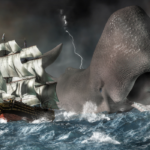
Nie masz czasu na zapoznanie się z całością artykułu?
Wystarczy, że klikniesz ikonę „oznacz artykuł do przeczytania później”. Wszystkie zapisane publikacje znajdziesz w profilu czytelnikaThree misconceptions the West has about China

In your book “Has China Won” you state that in the current contest between the U.S. and China, the U.S. behaves exactly like Soviet Union during the Cold War, and China behaves like America during a Cold War, which, by the way, sounds a bit shocking to Polish ears. Why do you think so?
The person who could answer that question was George Kennan, the master strategist of the United States, who had actually created the policy of containment against the Soviet Union. Kennan also gave some other pieces of advice to the United States: at the end of the day, the outcome of the contest between the United States and Soviet Union would not depend on the size of the military, on how many aircraft carriers you have. It would depend on the relative spiritual vitality of each society. And in the contest between United States and Soviet Union there was no question that there was far greater spiritual vitality in American society, and less spiritual vitality in the Soviet society.
If you look at critical indicators of social well-being – the United States is the only major developed society where life expectancy has decreased
Today, the United States is the only major developed country where the average income of the bottom 50 percent has gone down over a 30 year period, as I document in my book. And, by contrast, the Chinese have experienced the greatest improvements in their living standards in the last 40 years. And indeed, these years have been the best 40 years of in 4000 years of Chinese history. In Chinese society, there’s a tremendous amount of spiritual vitality and dynamism, which proves, that unlike the contest between the U.S. and the Soviet Union, in the one between China and the United States it is the Chinese people who have been experiencing an improvement in their standard of living, while many Americans have not.
What are the characteristics of the spiritual vitality that the Chinese have and the Americans lack?
If you look at critical indicators of social well-being – the United States is the only major developed society where life expectancy has decreased. The suicide rate in the US is significantly higher than in China. And, as you know, the Nobel laureate Angus Deaton has written a book called “Deaths of Despair and the Future of Capitalism”. He’s the one who said there’s a sea of despair among the white working classes in America. He’s the one who documents that there is no spiritual vitality, especially among the working classes. Of course, in America there’s a lot of spiritual vitality among the billionaires, but we are talking about the broad masses of the society, whose well-being deteriorates. And by contrast, if we look at the similar indicators of life expectancy, infant mortality, death from suicides and so forth, they show that China is steadily growing happier, and in some aspects it is already happier than the American society.
What are the reasons for the decrease of these indicators?
The first major misunderstanding is that the competitor in China is the same as the competitor in the Soviet Union
The reason is that the U.S., which used to be a vibrant democracy, with a government of the people, by the people, for the people – or the government of the one hundred percent, by the one hundred percent, for the hundred percent – has become a government of the one percent, by the one percent, for the one percent. So, functionally, the United States is a plutocracy. And I’m not the only one saying it. The late head of the Federal Reserve, Paul Volcker, has said the U.S. is a plutocracy. The Nobel laureate Joseph Stiglitz has said the U.S. is a plutocracy. Martin Wolf has said in the Financial Times that the U.S. is a plutocracy. So, when you have a plutocracy where most of the increase in income goes to the top one percent and the bottom 50 percent have not seen an improvement in their standard of living for 30 years, that’s the structural reason why the United States is lacking in spiritual vitality. And by contrast, China has become the opposite of a plutocracy, which is a meritocracy, where you have a government that selects the best people to serve in government. So it doesn’t matter whether you were born in the very rich or the very poor class. In China, if you are capable, you are given a chance to rise up and succeed in life. So the United States used to be known as the society where you have the highest degree of social mobility in the 1950, 1960s, 1970s. Today, if you are trying to escape the miserable conditions of the bottom 10 percent in a society, you are more likely to experience greater social mobility in China than in the United States of America.
However, China seems a very repressive society – both in a political and an economic sense. There are a lot of very hard-working people, e.g. in the production, and it’s very hard for them to get to the higher levels of the social ladder.
There are two dimensions of being repressive – economic and political. On the economic front, the answer is given by data. In China there used to be 800 million people living in absolute poverty in the year 1980, when Deng Xiaoping launched reforms is for modernization program. Today, the number of people living in absolute poverty is down to zero. A country that rescues 800 million people from absolute poverty is not a repressive society. At the same time, the United States used to have by far the largest middle class population in the world. Today it is China which has the world’s largest middle class population.
And in a political sense?
The mistake that people make is to assume that China is like the Soviet Union. I visited the old Soviet Union in 1976 and I know it very well. I went to Moscow many times. In those days, the United States would tell Soviet Union: “We cannot have proper relations with you unless you allow free emigration from the Soviet Union. You must allow your people to leave”. But China allows people to leave! In the year 2019, 130 million Chinese – that is now almost equal to the population of Russia – left China freely. Many of them came back. If China had been a repressive society, a gulag, they would not have left, and if they somehow had managed to leave, they wouldn’t have come back.
We are actually speaking about the understanding and misunderstanding of China in the West. You often emphasize that the biggest strategic mistake of America is not to have a long term strategy and not to understand China deeply. What are the biggest gaps in the Western countries’ knowledge and understanding of China?
The first major misunderstanding is that the United States assumes – because China is run by the Communist Party of China – and the Soviet Union was run by the Communist Party of the Soviet Union – that the competitor in China is the same as the competitor in the Soviet Union. But actually, that’s a huge mistake, because the goal of the Communist Party of China is not to resuscitate communism, or to export communism to the world. The goal of the Communist Party of China is to resuscitate the Chinese civilization. So what the United States is doing is competing with a four thousand year old Chinese civilization and not with the Communist Party.
The second mistake is the conviction that China will also be like the Soviet Union – that it will try to militarily expand overseas and compete with the United States militarily. Actually, the Chinese have no desire whatsoever to compete in the military dimension. China is actually quite happy that the United States is wasting a lot of money on unnecessary defence expenditures. Fareed Zakaria wrote a column in The Washington Post pointing out that the U.S.’s defence budget is far, far bigger than the Chinese defence budget, and most of it is wasting money. So that’s another mistake that it’s made.
The third mistake that is made is a fear that in one way or another, China is out to subvert American democracy or threaten the United States of America directly. And China has absolutely no desire to interfere in America’s internal affairs, and no desire whatsoever to conquer America or to establish bases in America.
In the case of Taiwan it’s important to emphasize that most countries in the world recognize that there’s “One China Policy” – and Taiwan is a part of China. Even Poland has developed official diplomatic relations with Beijing and unofficial relations with Taiwan
In that sense, the fundamental mistake that the United States is making, is that it’s taking all the assumptions from the Cold War and applying them to China when they do not apply do it at all. You also mentioned that I say that the United States lacks a strategy in dealing with China. As I document in the book, the man who gave me this insight was Henry Kissinger. And Henry Kissinger has written a whole book on China in which he documents how the Chinese always think long term and act strategically, and the United States is driven by short-term considerations and by popular opinion and not by careful long-term strategic thinking.
However, it’s very hard to agree that China is not an expansionist country, regarding the military tensions in Southeast Asia and around Taiwan.
Among the five great powers, namely the United States, Russia, France, U.K. and China, China is the only one that has not fought a major war in 40 years. And China actually hasn’t even fired a bullet across its border. That is, although it did have an engagement with India where Indian and Chinese soldiers fought with fists. So if you look at China’s record in terms of its use of military power, it has been the most restrained country in the use of military power.
In his book “Destined for War”, Graham Allison says that quite often Americans wish that China would be like the U.S.A, but they should be careful what they wish for, because China today in 2020 is where America was in 1890s, when it was emerging as a great power. And as soon as it happened, the U.S. declared war on Spain, seized the Philippines, conquered the Panama Canal, becoming a militarily expansionist power. Graham Allison says that China is not doing that – and he is an American political scientist! In the South China Sea, China has disputed territories with four ASEAN countries – Malaysia, Philippines, Brunei and Vietnam. If the Chinese military wanted to take over all the disputed features in South China Sea, it could do so tomorrow. It is militarily much stronger, and still it hasn’t taken over any of these beaches. China actually has not used military in the South China Sea. If it did so, it would win.
In the case of Taiwan it’s important to emphasize that most countries in the world recognize that there’s “One China Policy” – and Taiwan is a part of China. Even Poland has developed official diplomatic relations with Beijing and unofficial relations with Taiwan.
There is a danger of war – I agree. But it will not happen unless Taiwan declares independence. If it does so, China will go to war over it. But so far many years have passed and China hasn’t fought a war in Taiwan.
China’s geostrategic and economic policy also makes it very hard to agree that Beijing is not expansionist. I will quote you an American political scientist, Andrew Michta, who says: “The Chinese are trying to build an alternative supply chain across Eurasia – i.e., the Belt and Road. (…) In my view, Europe – which right now is the entry point to Eurasia for the Atlantic community writ large, and benefits tremendously from that – would become the tail end of the Chinese supply chain. And you’re dealing with a non-democratic government, in fact, a totalitarian state. A strong country that does not recognize the values you and I agree on. That means a fundamental change. If Europe were to fall into the sphere of influence of the Chinese imperial state, the consequences of that for the Western civilization as a whole would be profound”.
The Belt and Road initiative, of course, is very different. The key point to emphasize about it is that it’s an initiative which you are free to join or not join. Many countries refused to join. The United States doesn’t join, Australia doesn’t join, Japan doesn’t join, India doesn’t join. Some countries have chosen not to join, but out of 193 countries, 130 have joined voluntarily. They are not forced to do so. And the reason why they do so is because by cooperating with China, they either get – like Indonesia – a new high speed train between Jakarta and Bandung, or – like Uzbekistan – a wonderful tunnel that cuts across the country. Before it was built, it would take nine days to go across the country. Now, China has built a tunnel in 900 days which can be used to cross the country in 900 seconds. This is the choice you have. In fact, even Fareed Zakaria in his column on US and China stated that the United States spent 1,7 trillion dollars trying to build the F-35 aircraft, which is fantastic, but it’s a waste of money, because at the same time China has spent 1,7 trillion dollars on the BRI, which is free to join. If Andrew Michta is right, then European countries shouldn’t join the BRI. There is no pressure on them to join it at all.
Mike Pence argues that the European countries should decide which side are they on. And in your book, you state that in the future, the West will actually have to share its power with Asia, mostly with China, or abandon its domination. How do you envision this process of sharing powers? And why should we – in Europe – not be afraid a bit about this? We are actually dealing with a quite different system. And in our way of seeing the world, it is actually repressive, because most of us wouldn’t like to live under such a political control as in China.
If Europe wants to protect its own interests, it should promote development in Africa first
When it comes to geopolitics, most countries put their own national interests first and not their values. In the Cold War, China was a much more repressive state under Mao Zedong. You had the Cultural Revolution. You had the Great Leap forward. But in 1971 The United States embraced China enthusiastically, even though its human rights record was much worse. And they did it for one simple reason – that in geopolitics, you always put your national interests first. Even today, the United States is an ally of Saudi Arabia, even though Saudi Arabia is not a democracy. It’s very important for Europeans not to be naive about geopolitics. In geopolitics, values and principles come second to interest. And as you know, I devote a large part of my book to explaining what is the biggest geopolitical challenge that Europe faces today.
What is it?
In the old days, the biggest fear that Europe had, was the fear of Russian tanks coming to invade Europe. Today, the biggest challenge for Europe are no longer Russian tanks, but the demographic explosion in Africa. The population of Africa in 1950 was half that of Europe’s, and today, it is more than double that of Europe. By 2100, Africa’s population will be ten times the size of Europe. And I guarantee you this, that unless there is development in Africa, lots of Africans will be migrating to Europe. And when Africans migrate to Europe, you’ll get a backlash and an emergence of far right parties. Therefore, if Europe wants to protect its own interests, it should promote development in Africa first. That’s the number one strategic challenge. And the number one investor in Africa is not the United States of America, but China. So, if Chinese investments in Africa, whether in building ports, railroads, highways, end up creating jobs in Africa, that is actually a geopolitical gift to Europe. So I would say that when it comes to geopolitics, the Europeans should be as shrewd as all the other great powers and put their interests first to protect their own people.
Zobacz
The idea of “Solidarity” has been killed in Poland after 1989. Law and Justice fills this space only rhetorically
The tragedy of Poland is that it had to conform to the demands of the international Western community. It had to become aggressively capitalist and corporatist and it could not assert its independence. Jarema Piekutowski interviews Maurice Glasman
Khanna: Just because I'm a geopolitician by education, does not mean I'm an ideologue. Conectivity today is a battlefield for influence
Is Parag Khanna the second Fukuyama? Will we see a brutal race for the greatest possible connectedness? Or will conectivity bring peace, reduce the number of classic warfare? What will be the role of the West in this competition, and how much will the Belt and Road initiatives mean? Will nation-states fade away in favor of tribalism?
A Tale of Two Monsters and Four Elements: Variations of Carl Schmitt and the current global crisis
We have a class of scientific technocrats directing the work of a class of politicians without honour, who utterly subordinate everyone else. Only a spiritual revolution will save us now
India is, and will be a non-aligned power in the New Cold War
India is a non-aligned power; this move not only protects its own varied relations (as seen with India-Russia ties and even India-China bilateral) but also allows it to provide guidance and support to smaller economies in Asia and the Indo-Pacific
The Sino-Russian relationship should not be seen as an alliance of revisionist powers
Chinese do not feel comfortable with the seemingly endless “endism” produced by Western intellectual elites, be it Fukuyamanian “end of history” at the end of the Cold War, or the recent variant of the “end” of the so-called liberal international order (LIO)























